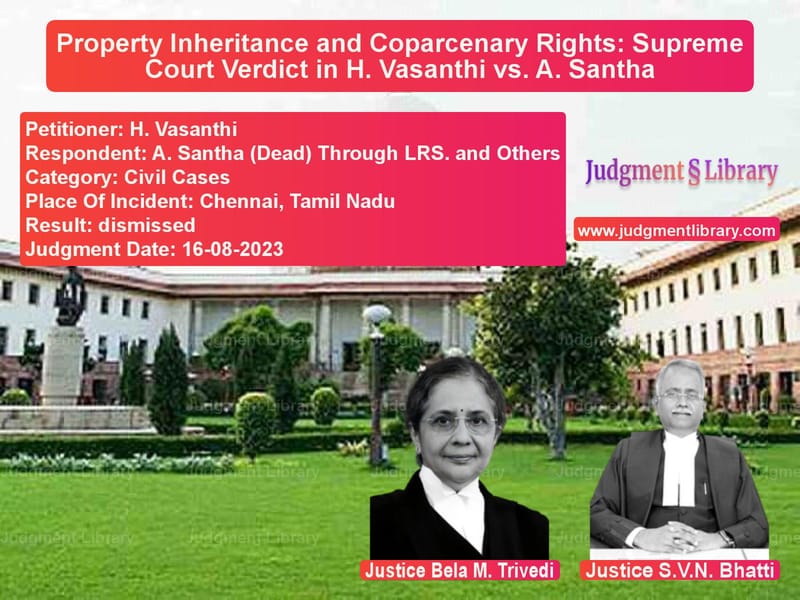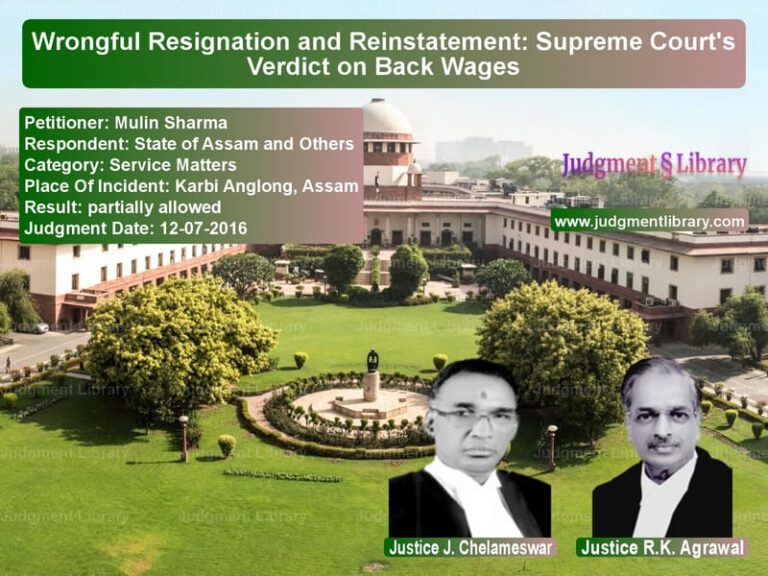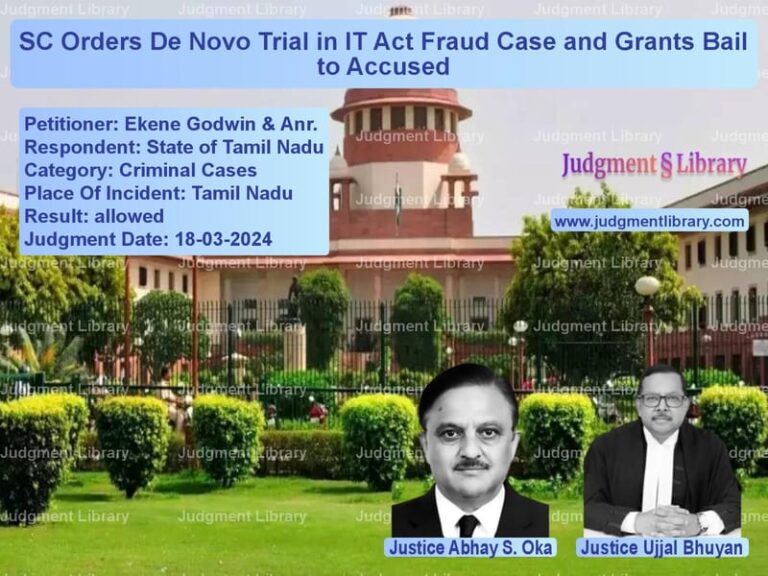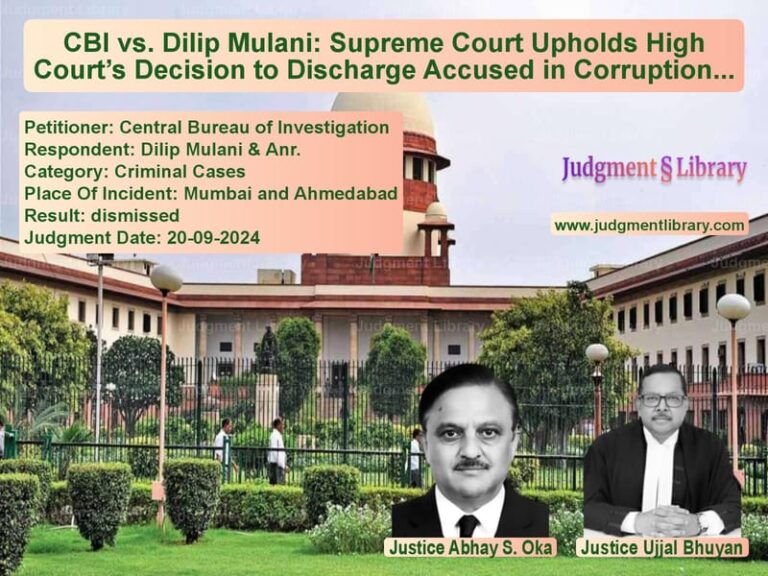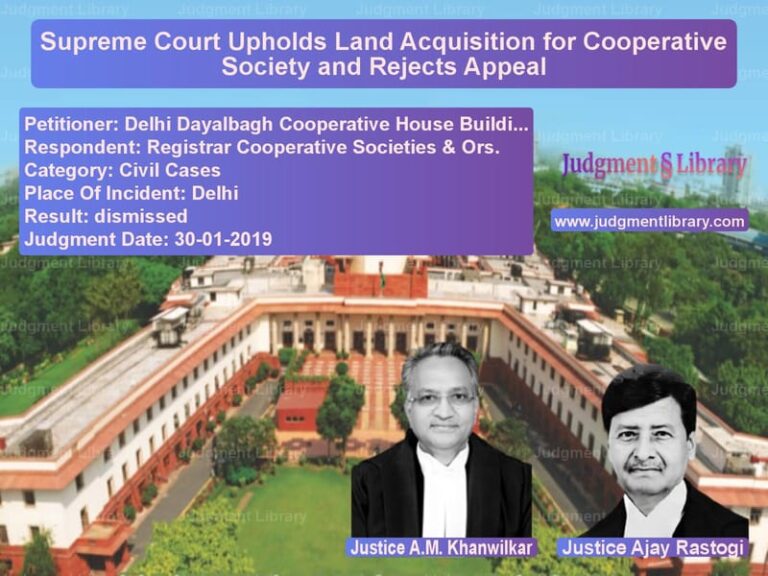Property Inheritance and Coparcenary Rights: Supreme Court Verdict in H. Vasanthi vs. A. Santha
The Supreme Court of India recently delivered a significant judgment in the case of H. Vasanthi vs. A. Santha (Dead) Through LRS. and Others, addressing the issue of coparcenary rights under the Hindu Succession Act, particularly in light of the Tamil Nadu Amendment. The verdict, delivered by Bela M. Trivedi and S.V.N. Bhatti, upheld the decisions of the lower courts, denying the plaintiff’s claim for partition of ancestral property.
Background of the Case
The case revolves around a property dispute concerning a piece of land and a building located at 24/1, Gomathy Narayanaswamy Road, T-Nagar, Chennai. The plaintiff, H. Vasanthi, filed a suit seeking:
- A declaration that she is a coparcener under the Tamil Nadu Amendment to the Hindu Succession Act.
- Partition and separate possession of her claimed one-third share in the property.
- An injunction preventing defendants from disposing of the property.
She based her claim on Section 29A of the Hindu Succession Act (Tamil Nadu Amendment), which grants unmarried daughters coparcenary rights in Hindu joint family property.
Chronology of Events
- 1924: The property was purchased by the plaintiff’s grandfather, Dr. H. Venkat Rao.
- 1974: The plaintiff’s father (Defendant No. 1) and brother (Defendant No. 2) entered into an agreement to sell the property to Defendant No. 3.
- 1981: Defendant No. 3 filed a suit (OS No. 2595 of 1981) for specific performance, which was dismissed.
- 1984: The High Court reversed the trial court’s decision and granted specific performance in favor of Defendant No. 3.
- 1989: The Tamil Nadu Amendment conferred coparcenary rights on unmarried daughters.
- 1995: The Supreme Court dismissed an appeal against the High Court’s decision, affirming the sale to Defendant No. 3.
- 1996: The plaintiff filed a fresh suit (OS No. 746 of 1996) for partition and separate possession.
Petitioner’s Arguments
The plaintiff, H. Vasanthi, contended that:
- The property was inherited by her father, making it joint Hindu family property.
- She acquired coparcenary rights under the Tamil Nadu Amendment in 1989.
- Since the High Court’s decision in 1984 did not involve her as a party, her share remained unaffected.
- The sale to Defendant No. 3 did not extinguish her right to claim partition.
Respondent’s Arguments
The defendants, including the buyer of the property, argued that:
- The property was subject to a binding sale agreement in 1974, long before the Tamil Nadu Amendment.
- The plaintiff’s claim was barred as she did not challenge the High Court’s 1984 decision.
- The property had already been transferred legally, and there was no coparcenary left for partition.
- The plaintiff had previously accepted a partial partition in 1980, which excluded the disputed property.
Supreme Court’s Analysis
The Supreme Court examined whether the plaintiff’s claim to coparcenary rights and partition was legally valid. It made the following key observations:
“The applicability of Section 29A is not the deciding factor; rather, the determining question is whether the suit property was available for partition when the amendment came into force.”
The Court concluded:
- The plaintiff failed to demonstrate that the property was still part of the coparcenary when she claimed partition.
- The sale agreement executed in 1974 and the subsequent litigation concluded in 1995 effectively transferred ownership.
- The plaintiff was a signatory to the 1980 partial partition, which did not include the disputed property.
- Once a property is sold, it ceases to be available for partition among coparceners.
Final Verdict
The Supreme Court upheld the decisions of the trial court and the High Court, ruling:
- The property was not available for partition as of 1989.
- The plaintiff’s claim under Section 29A of the Tamil Nadu Amendment was inapplicable.
- The suit for partition was rightly dismissed.
In its concluding remarks, the Court emphasized:
“The plaintiff, despite being a coparcener, failed to establish that the property remained coparcenary at the time of her claim.”
The ruling clarifies that while statutory amendments may grant new rights, such rights cannot be exercised retrospectively against properties already alienated through legal transactions.
Petitioner Name: H. Vasanthi.Respondent Name: A. Santha (Dead) Through LRS. and Others.Judgment By: Justice Bela M. Trivedi, Justice S.V.N. Bhatti.Place Of Incident: Chennai, Tamil Nadu.Judgment Date: 16-08-2023.
Don’t miss out on the full details! Download the complete judgment in PDF format below and gain valuable insights instantly!
Download Judgment: h.-vasanthi-vs-a.-santha-(dead)-thr-supreme-court-of-india-judgment-dated-16-08-2023.pdf
Directly Download Judgment: Directly download this Judgment
See all petitions in Property Disputes
See all petitions in Succession and Wills
See all petitions in Judgment by Bela M. Trivedi
See all petitions in Judgment by S.V.N. Bhatti
See all petitions in dismissed
See all petitions in supreme court of India judgments August 2023
See all petitions in 2023 judgments
See all posts in Civil Cases Category
See all allowed petitions in Civil Cases Category
See all Dismissed petitions in Civil Cases Category
See all partially allowed petitions in Civil Cases Category

